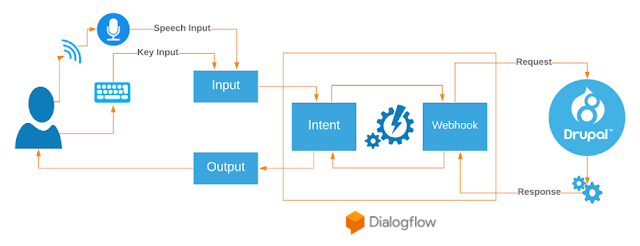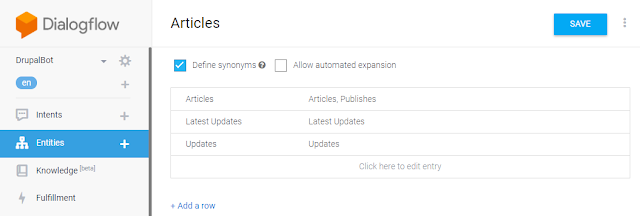Chat Bots are giant step in transforming CMS to next generation of Digital experiences and engagement - Part 1
Artificial Intelligence has grown by leaps and bounds and showcased its efficacy to the world and leaving behind solid footprints in almost all walks of life. Its domain of service is expanding from Online Business platforms to Education, Health, Agriculture, e-Governance and as many as can be listed here would be less. One of the fast growing service that it can provide is in promising Digital engagement.
Live Assistants or Chat Bots are proving to be a next technological advancement in providing a better and unprecedented digital experience and strong customer relations. In this blog we will be building a Chat Bot on top of Drupal as Content Management System(CMS) and using Google Assistant Development Framework(DialogFlow) as Natural Language Processing(NLP) platform.
Our Agenda here are:
1. Snapshot of the Complete Process
2. Ngrok - Supporting Local Web Server as HTTPS
3. Configuring and Working with Dialogflow
4. Basic Module in Drupal 8 to Communicate with Dialogflow
5. Future Scope
Dialogflow (formerly api.ai) is an HCI(Human-Computer Interaction) technology which can be used for building voice and text-based conversational interfaces powered by AI.
Drupal is an open source content management system (CMS). CMS are the back-end infrastructures of websites that allow content to be created and managed with greater ease.
The User makes a request (Speech/Key input) native to the application (Here its Drupal), but the request is internally transferred to Dialogflow for NLP. The Dialogflow processes the request and make another POST request to Native application (Here its Drupal ) for a custom response, that would be sent to User. In order to communicate with Drupal efficiently without fail, Dialogflow uses concept of WEBHOOKS. To use webhooks we need to fulfil webhooks requirements as specified by Dialogflow. There by Dialogflow accepts only HTTPS web services URL. To make our local Drupal development live we will be using Ngrok services. Working details is in section 2 below.
Live Assistants or Chat Bots are proving to be a next technological advancement in providing a better and unprecedented digital experience and strong customer relations. In this blog we will be building a Chat Bot on top of Drupal as Content Management System(CMS) and using Google Assistant Development Framework(DialogFlow) as Natural Language Processing(NLP) platform.
Our Agenda here are:
1. Snapshot of the Complete Process
2. Ngrok - Supporting Local Web Server as HTTPS
3. Configuring and Working with Dialogflow
4. Basic Module in Drupal 8 to Communicate with Dialogflow
5. Future Scope
1. Snapshot of the Complete Process
Dialogflow (formerly api.ai) is an HCI(Human-Computer Interaction) technology which can be used for building voice and text-based conversational interfaces powered by AI.
Drupal is an open source content management system (CMS). CMS are the back-end infrastructures of websites that allow content to be created and managed with greater ease.
The User makes a request (Speech/Key input) native to the application (Here its Drupal), but the request is internally transferred to Dialogflow for NLP. The Dialogflow processes the request and make another POST request to Native application (Here its Drupal ) for a custom response, that would be sent to User. In order to communicate with Drupal efficiently without fail, Dialogflow uses concept of WEBHOOKS. To use webhooks we need to fulfil webhooks requirements as specified by Dialogflow. There by Dialogflow accepts only HTTPS web services URL. To make our local Drupal development live we will be using Ngrok services. Working details is in section 2 below.
2. Ngrok - Supporting Local Web Server as HTTPS
To make our local development go live or HTTPS, we need to install NGROK. NGROK helps exposing our local development to internet. Download NGROK by going to the link: Click Here here.
Once downloaded install the NGROK. Go to cmd C:\folder_location\ngrok-stable-windows-amd64 and execute below command:
ngrok http -host-header=rewrite 123.132.156.219:80
//(Change the IP as of your system and Port 80 to Your Server Port. By default 80 is the Server port)
On execution you will see the below screen with publicaly accessible URLs generated by Ngrok. We will be using these URLs to Configure our Dialoflow Webhook call Fulfillment tab.
Configuring and Working with Dialogflow and next items are continued in Part 2.




Comments
Post a Comment